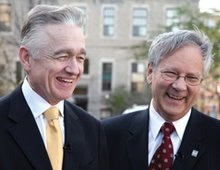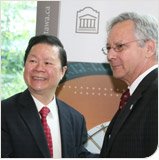
(Press Release, Ottawa, Canadian Friends of Burma, December 11, 2007)
The Canadian Friends of Burma urges the University of Ottawa to immediately revise the huge wall panel dedicated to the life and work of Paul Desmarais located on the university campus. The University must include information regarding Mr. Desmarias serving on the Board of Directors of Total, the French energy giant which operates a gas pipeline in Burma in partnership with Burma’s violent military dictatorship. The panel dedicated to Mr. Desmarais is on the ground floor of a new building at the university named after the billionaire. Mr. Demasrais, patriarch of the family that controls Power Corp donated $15 million to the University of Ottawa, the funds were used for the construction of the 12 storey Desmarais building.
Although the wall panel recounts in great detail Mr. Desmarais’s life there is no mention of his involvement with Total. Mr. Desmarias, served on the board of the French oil conglomerate from January 1999 till May 2002 when he gave his seat to his son Paul Desmarais Jr who continues to sit on the board. At present Power Corp. controls the largest shareholder in Total, Groupe Bruxelles Lambert (GBL) a Belgium based holding company that owns a 3.9% stake in Total.
Total is infamous for its operations in Burma in which it partnered with the Burmese military and UNOCAL to construct and then operate the Yadana natural gas pipeline. The Burmese military forcibly relocated villagers from their land to make way for the pipeline. During the relocation the villagers were raped, tortured and killed. The Burmese military forced villagers to construct infrastructure for the pipeline including helicopter landing pads and barracks for the soldiers.
Over the eight years that Power Corp has controlled the largest shareholder in Total, both the Desmrais family and Power Corp have repeatedly declined to comment on Total’s activities in Burma. Refusing to even acknowledge the controversy surrounding Total’s operations in Burma is an insult to the thousands of people in Burma who suffered greatly at the hands of Burma’s military government so Total could make a profit.
A French Parliamentary mission that investigated the pipeline concluded in October 1999 that
“The mission judges that the link between the military presence, the acts of violence against the populations and the forced labor is established as a fact. Total had to be aware of that fact.”
The Parliamentary Inquiry added
“It seems artificial to separate the construction of the pipeline which required the hiring of qualified labor and considerable technical means from the measures taken by the Burmese regime to ensure its safety. . . These security measures were what generated forced labor and population displacements in the area”.
A February 1st 1996 memo from Total Business Development Manager Hervé Chagnoux to UNOCAL substantiates the claim that Total paid Burma’s military to provide security and also suggests that Total was well aware of the use of forced labour,
“As far as forced labour used by the soldiers in charge of security on our gas pipeline project is concerned, we must admit between ourselves, TOTAL and Unocal, that we’re probably in a grey area.”
Natural Gas exports are by far the largest source of revenue for Burma’s military Junta. Total’s operations alone have annually provided the military dictatorship with hundreds of millions of dollars in revenue (some estimates are as much as US$450 million). Rather than spend the revenues on education or badly needed humanitarian supplies Burma’s generals continue to use their new found wealth to reinforce their own position by buying millions of dollars worth of weapons from China. These weapons are used to terrorize the population and kill scores of innocent people.
Nobel Peace Prize winner and leader of Burma’s democratic opposition Aung San Suu Kyi has repeatedly criticized Total for its harmful presence in Burma. She told Le Monde newspaper “Total has become the main supporter of the Burmese military regime.”
For a detailed description of the human rights abuses committed during the construction of the Yadana pipeline please read the 2000 Report issued by Earth Rights International called Total Denial Continues.
Also see the February 2005 Report by The Burma Campaign UK called “Total Oil: Fueling the Repression in Burma”
------------------------------------------
145 Spruce St. Suite 206
Ottawa, ON K1R 6P1
Tel: 613.237.8056
Fax: 613.563.0017
------------------------------------------
UofOWatch Comment:
U of O President Gilles Patry’s astonishing response to a December 11, 2007, public request to acknowledge these facts is described HERE.
Given a second occasion to respond, Patry explained that the $15 million Desmarais donation was a “personal gift” to the university.
Paul Desmarais is a Companion of the Order of Canada and a member of the Privy Council.
Canada’s university recently honoured Paul Desmarais with one of its Distinguished Canadian Leadership Awards:
“As a university we have an obligation to provide people with the skills and understanding they need to take their place in the world. Because of our unique position in Ottawa and in Canada, the University of Ottawa has an opportunity to cultivate leaders showing what true Canadian leadership looks like …”
[Photo: Detail of the Demarais bio wall panel in the Demarais Building, University of Ottawa.]




















